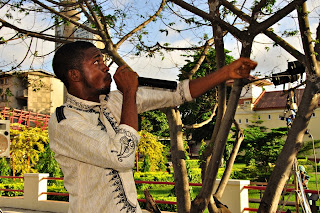The nursery rhymes of unending skipping sound resounding from the high-rise windows and the slit walls of the kindergarten school, remains the oldest known and surest way of imparting alphabets, sounds, objects and ideas, to a classroom of children, who are freshly being opened up to the mystery of learning and acquiring all the needed skills with which to gulp up knowledge as they grow up.
The fundamental of nursery education is the very tool employed by the poet who takes after the method of the teacher, who must function as the choir master, charging out the call to chant that is automatically echoed by the pupils to glean the golden fleece home.
The chant of poetry is not any different in the hands of the priestess of poetry, the wildest of imagination engages the emotions in a celebration of words in its ever best use-in a crescendo of rising staccato that leaves the poet and its lovers in an exchange of fulfillment striking the cord of the heart into an orgasmic climax that homes the being into the soul.
From the first exercise of one trying to word to oneself or other selves, some structure of finely written poems riddled on paper, to the point where the personae or reader's innermost cavity is filled and the exterior body overflows with interpretative high spirit, chant sails salient to the meaning of poetry which enfolds the whole conundrum of life.
In contemporary literature, poets in tameless adventure have seek mediums, not just to make this genre more relevant and alive but to bridge the TEXT to the WORD. Chant eventually aroused as the most efficient and strongest tool adopted by the priestess of poetry who led the search. To relate this is to fore mostly understand the basic of chant.
Chant is the rhythmic speaking or singing of words or sound often primarily on one or two pitches called reciting tones. it may range from a single melody involving a limited set of notes to a highly set of complex musical structures, often included a great deal of repetition of musical subphrases. Chants functions as a heightened or stylized form of speech which though exist as a genre of its own yet allies with the priestess to render, perform and execute a poem.
The priestess is that devotee poet in the shrine of poetry who is most passionate and liberal in worship. To read a poem goes beyond the mere silent stiff absorption of the lines as text, to the lowest motion and loudest recitation celebrated in chant. It is this act that makes it more ritual to the self.
There exist several means and routes to approach poetry, such as writing, reading, listening,reciting, etc but to enter the altar of poetry where the priestess dwells, you must leave behind your media and gadget, to enjoy the secret powers inhabited in the realm of this veneration which is an open home to all and sundry.
When a devotee recites a poem, chant heightens the notes of mood, fires the tone, repeating the lines then drags the being(s) to where you confront your very thoughts BARED. Leaving you before yourself is the best resolution any fellow seeker can derive when you read a poem.
Chanting does not change or cheapen the form of your poem, best seller or award(s)-winning poetry collections, instead it exhumes life from the dumb gawking words, rendering it, a priceless performance which creates an unusual symphony of stress, style, and state to the original form that in no little measure helps to bring a better understanding of the meaning chased by the poet and the piece itself.
No wonder when chanting a verse line, getting caught in the rhyme and rhythm, one begins to tail the beat before the long , gesturing, fingers and hands swaying on foot tapping, while others completely internalized the process before them, are entrapped into a cocoon of themselves and can only return to themselves to seek meaning.
The priestess is a seeker who lives to proffer poetry not just as an inanimate text idol stagnated on colossal forgotten shelves for some chosen cerebral minds but as a free theatre for all who quest for purification and restoration of body, mind, and soul.
Poetry is a religion, it is a tradition, and those whose must follow, should worship in chant and spirit.
©Uche Uwadinachi















































